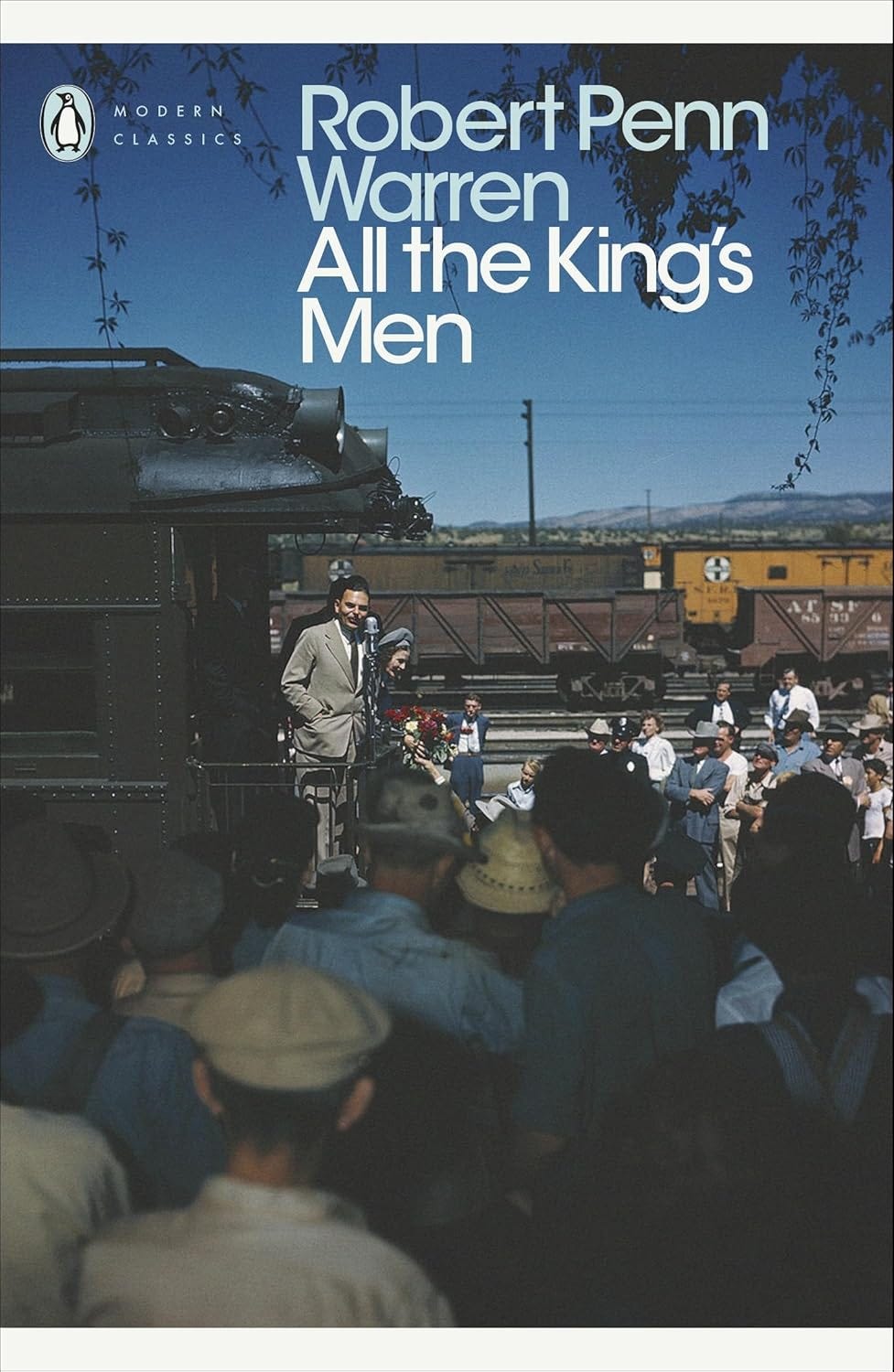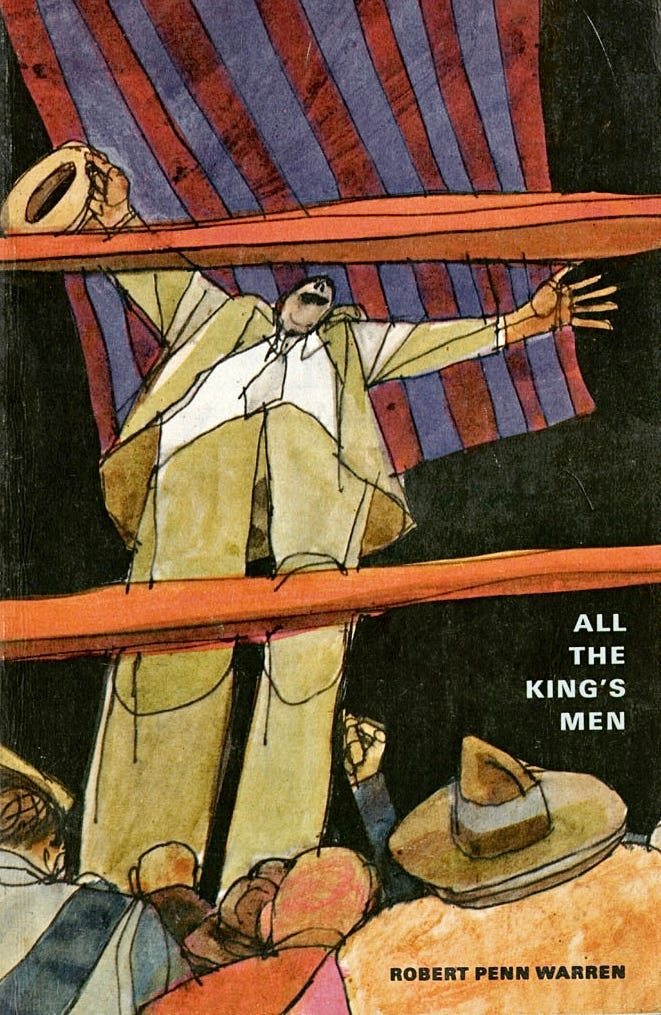Stark Truth: All the King’s Terrible Choices
What America’s Greatest Political Novel Reveals about Us All. Reviewing Robert Penn Warren’s Pulitzer Winning Novel
Jack Burden keeps it all in his little black books, notebooks he stuffs in a safety deposit box when they’re full “because,” he says, “they aren’t something to leave around and because they would be worth their weight in gold to some parties to get their hands on. Not that they ever got their hands on them,” he clarifies, “I never needed money that bad.”
Jack’s notebooks are the day-to-day record of his work for Willie Stark, corrupt governor of an unnamed state in the Deep South. An aspiring historian turned newspaperman, Jack goes to work for Willie when he quits his journalism job over his refusal to back his paper’s favored candidate. Willie thinks he can manage Jack better than his prior bosses and offers him a job.
Robert Penn Warren’s Pulitzer-winning novel All the King’s Men begins with Jack already on the payroll, but Willie’s story starts some time before in Mason City, where the goodhearted but naive backwoods attorney serves as county treasurer, drawn to populist reform politics after shoddy school construction from a corrupt contract leads to the deaths of several kids.
Willie quickly earns a sterling reputation for unwavering integrity. Unfortunately, his naivety and idealism make him ripe for manipulation by craftier hands. When he’s encouraged to run for governor, he doesn’t realize he’s being used to split the reform vote, ensuring the corrupt candidate wins. Willie backs out once he discovers the ruse, but the betrayal twists him; men were playing a secret game, and now Willie had discovered the rules. He could play too.
The next time he runs for governor Willie Stark wins and puts his hard-bought knowledge to work. He establishes his administration through a mix of carrot, stick, and cunning—keeping, for instance, undated resignation letters from his appointees in case he needs to easily remove them.
Stark’s inner circle includes the sharp-tongued Sadie Burke, his mistress and political operative; Sugar-Boy, his stuttering, trigger-happy bodyguard; and Tiny Duffy, the useful but dangerous idiot who serves as his lieutenant governor. It also includes Jack, who is of particular use to Willie.
Stark begins with good intentions, honesty, fair dealing, and reform, but soon realizes he needs a different approach if he plans to get anywhere. Both men are driven by principles, but Willie’s are modified by his realism, Jack’s by his cynicism. And because of all the dealings scribbled in those little black books—some good, some bad, some very bad—“The story of Willie Stark and the story of Jack Burden are, in one sense,” says the narrator, “one story.”
‘Dirt Makes the Grass Grow’
As governor, Stark launches a string of initiatives—building schools, roads, and bridges. Whatever underhanded tactics he might employ he can excuse by pointing to the all good he does. “It’s dirt makes the grass grow,” as he says.
Keen on helping the “hicks” with whom he identifies, Stark envisions for his crowning achievement a massive state-run hospital that will serve rich and poor alike. The only problem? It’ll cost money, gobs of it. And it’ll require an effective administrator. And that’s when Willie’s dreams for the future run smack dab into Jack’s past, producing a string of casualties along the way, including Willie himself.
The link is a place as much as a person: Burden’s Landing. Jack comes from privilege, and the affluent seaside neighborhood bespeaks old family money and good connections—everything Willie detests.
Jack grew up at Burden’s Landing, alongside his friends Adam and Anne Stanton, the children of the Willie’s predecessor in the governor’s mansion. As a teen Jack fell for Anne, but the romance never found any footing. Adam went on to become the best surgeon in the state. Jack’s mother still lives there, as does Judge Irwin, a family friend and father figure to Jack. And it’s this little social cluster that forms the explosive center of the novel.
Willie wants Adam Stanton to serve as the administrator of his hospital project. Stanton can’t tolerate Willie’s politics, but Jack and Anne convince him that he could do a lot of good in the position. He signs on.
The judge, however, does not. Politically active, the judge opposes Stark, endorsing a Senate nominee sure to undermine Willie. Stark responds by instructing his historian-turned-newspaperman-turned-political hack to dig up dirt on the judge.
“I don’t reckon you will find anything on Irwin,” protests Jack, trying to dodge the assignment, one for which the glaring conflict of interest proves even deeper than he realizes.
“You find it,” says Willie. “Man is conceived in sin and born in corruption and he passeth from the stink of the didie to the stench of the shroud. There is always something.” Of course, there is. And when Jack discovers it, it unleashes forces that leave three men dead.
Myth and Fact
When Warren published All the King’s Men in 1946, people were quick to compare Willie Stark to Louisiana’s boisterous and eventually assassinated senator Huey Long. He might have been an inspiration, but Warren disliked the comparison.
“What Louisiana and Senator Long gave me was a line of ‘thinking and feeling’ that did eventuate in the novel,” he said. But he was “concerned more with the myth than the fact, more with the symbolic than the actual.” That’s because he had a far bigger story to tell. The quintessential American political novel was, for its author, only incidentally about politics. You can read it as a lengthy meditation on power and our mutual responsibility for how it’s employed.

I emphasize meditation because while All the King’s Men is a novel of action and events, it’s also ruminative. Told from Jack’s perspective, a man not only with his box of black books but also his troubled memory, the narrative veers and jumps from the present to the past as he makes sense of the forces that have shaped those events.
The lengthiest digression involves Jack’s abandoned doctoral dissertation on the Civil War-era journal of Cass Mastern. Mastern’s own black book reveal his betrayal of a friend—an affair with the man’s wife. The friend commits suicide, but that’s not the end of it. Mastern sees an unfolding string of consequences and it fills him with dread:
I suddenly felt that the world outside of me was shifting and . . . the process had only begun of a general disintegration of which I was the center. . . . It was as though the vibration set up in the whole fabric of the world by my act had spread infinitely and with ever increasing power and no man could know the end.
Jack believes that good and bad happen more or less at random, “The Great Twitch,” he calls it. But Mastern’s story reveals human culpability is real, interconnected, and runs far and wide. As a doctoral student, the insight stumped him. He worked on the papers for eighteen months and quit because, despite his immersion in the material, “he did not know Cass Mastern.”
But the narrator knows better. Jack was avoidant: “Perhaps he laid aside the journal of Cass Mastern not because he could not understand, but because he was afraid to understand for what might be understood there was a reproach to him.” Jack abandons the work, but it doesn’t abandon him, and his avoidance goes on to plague his relationship with Willie.
Aiding and abetting Stark’s ambitions and eventual demise might have been bad enough, but the carnage only ripples and spreads with Jack, like Cass Mastern, at the center. Yet with devastation all around him, Jack finally gets it. He understands Cass Mastern, that his own hand started the vibration in the fabric of the world.
After Willie’s death, Jack faces a choice. An opportunity for revenge presents itself. He can take advantage of it with no apparent complicity—the perfect cover, actually—or he can refuse to let the ripples spread further. It’s a choice Warren offers us all.
All the King’s Men is book No. 9 in my classic novel goal for 2024. Here’s what I’ve read so far and what’s still in store.
January: F. Scott Fitzgerald, The Great Gatsby
February: Alice Walker, The Color Purple
March: Thornton Wilder, The Bridge of San Luis Rey
April: Gwendolyn Brooks, Maud Martha
May: Chuang Hua, Crossings
June: Willa Cather, My Àntonia
July: Kurt Vonnegut, Slaughterhouse-Five
August: Ngũgĩ wa Thiong’o, A Grain of Wheat
September: Robert Penn Warren, All the King’s Men
October: Ray Bradbury, Something Wicked This Way Comes
November: George Eliot, Middlemarch
December: Ernest J. Gaines, A Lesson Before Dying
Thanks for reading! If you enjoyed this post, please hit the ❤️ below and share it with your friends.
Not a subscriber? Take a moment and sign up. It’s free for now, and I’ll send you my top-fifteen quotes about books and reading. Thanks again!




Now this is a perfectly timed article.
This novel was adapted into a film by screenwriter/director Robert Rossen in 1949 which won several Academy Awards.